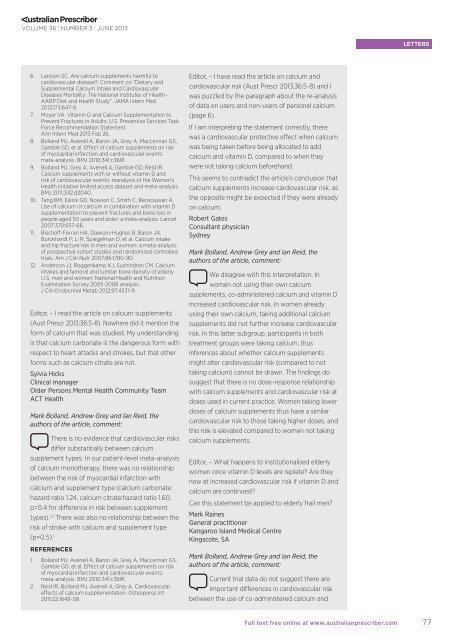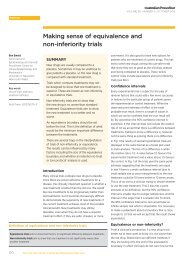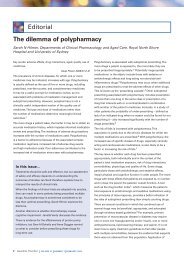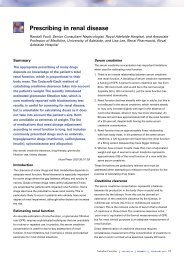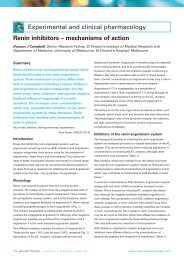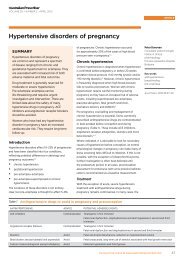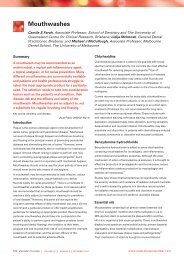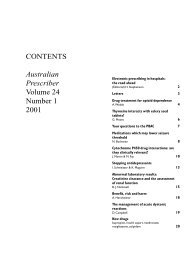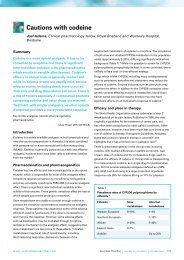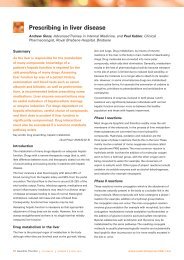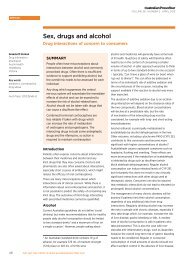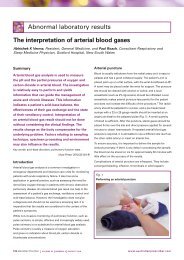download the full PDF issue - Australian Prescriber
download the full PDF issue - Australian Prescriber
download the full PDF issue - Australian Prescriber
You also want an ePaper? Increase the reach of your titles
YUMPU automatically turns print PDFs into web optimized ePapers that Google loves.
VOLUME 36 : NUMBER 3 : JUNE 2013<br />
LETTERS<br />
6. Larsson SC. Are calcium supplements harmful to<br />
cardiovascular disease: Comment on “Dietary and<br />
Supplemental Calcium Intake and Cardiovascular<br />
Diseases Mortality: The National Institutes of Health–<br />
AARP Diet and Health Study”. JAMA Intern Med<br />
2013;173:647-8.<br />
7. Moyer VA. Vitamin D and Calcium Supplementation to<br />
Prevent Fractures in Adults: U.S. Preventive Services Task<br />
Force Recommendation Statement.<br />
Ann Intern Med 2013 Feb 26.<br />
8. Bolland MJ, Avenell A, Baron JA, Grey A, MacLennan GS,<br />
Gamble GD, et al. Effect of calcium supplements on risk<br />
of myocardial infarction and cardiovascular events:<br />
meta-analysis. BMJ 2010;341:c3691.<br />
9. Bolland MJ, Grey A, Avenell A, Gamble GD, Reid IR.<br />
Calcium supplements with or without vitamin D and<br />
risk of cardiovascular events: reanalysis of <strong>the</strong> Women’s<br />
Health Initiative limited access dataset and meta-analysis.<br />
BMJ 2011;342:d2040.<br />
10. Tang BM, Eslick GD, Nowson C, Smith C, Bensoussan A.<br />
Use of calcium or calcium in combination with vitamin D<br />
supplementation to prevent fractures and bone loss in<br />
people aged 50 years and older: a meta-analysis. Lancet<br />
2007;370:657-66.<br />
11. Bischoff-Ferrari HA, Dawson-Hughes B, Baron JA,<br />
Burckhardt P, Li R, Spiegelman D, et al. Calcium intake<br />
and hip fracture risk in men and women: a meta-analysis<br />
of prospective cohort studies and randomized controlled<br />
trials. Am J Clin Nutr 2007;86:1780-90.<br />
12. Anderson JJ, Roggenkamp KJ, Suchindran CM. Calcium<br />
intakes and femoral and lumbar bone density of elderly<br />
U.S. men and women: National Health and Nutrition<br />
Examination Survey 2005-2006 analysis.<br />
J Clin Endocrinol Metab 2012;97:4531-9.<br />
Editor, – I read <strong>the</strong> article on calcium supplements<br />
(Aust Prescr 2013;36:5-8). Nowhere did it mention <strong>the</strong><br />
form of calcium that was studied. My understanding<br />
is that calcium carbonate is <strong>the</strong> dangerous form with<br />
respect to heart attacks and strokes, but that o<strong>the</strong>r<br />
forms such as calcium citrate are not.<br />
Sylvia Hicks<br />
Clinical manager<br />
Older Persons Mental Health Community Team<br />
ACT Health<br />
Mark Bolland, Andrew Grey and Ian Reid, <strong>the</strong><br />
authors of <strong>the</strong> article, comment:<br />
There is no evidence that cardiovascular risks<br />
differ substantially between calcium<br />
supplement types. In our patient-level meta-analysis<br />
of calcium mono<strong>the</strong>rapy, <strong>the</strong>re was no relationship<br />
between <strong>the</strong> risk of myocardial infarction with<br />
calcium and supplement type (calcium carbonate:<br />
hazard ratio 1.24, calcium citrate:hazard ratio 1.60,<br />
p=0.4 for difference in risk between supplement<br />
types). 1,2 There was also no relationship between <strong>the</strong><br />
risk of stroke with calcium and supplement type<br />
(p=0.5). 1<br />
REFERENCES<br />
1. Bolland MJ, Avenell A, Baron JA, Grey A, MacLennan GS,<br />
Gamble GD, et al. Effect of calcium supplements on risk<br />
of myocardial infarction and cardiovascular events:<br />
meta-analysis. BMJ 2010;341:c3691.<br />
2. Reid IR, Bolland MJ, Avenell A, Grey A. Cardiovascular<br />
effects of calcium supplementation. Osteoporos Int<br />
2011;22:1649-58.<br />
Editor, – I have read <strong>the</strong> article on calcium and<br />
cardiovascular risk (Aust Prescr 2013;36:5-8) and I<br />
was puzzled by <strong>the</strong> paragraph about <strong>the</strong> re-analysis<br />
of data on users and non-users of personal calcium<br />
(page 6).<br />
If I am interpreting <strong>the</strong> statement correctly, <strong>the</strong>re<br />
was a cardiovascular protective effect when calcium<br />
was being taken before being allocated to add<br />
calcium and vitamin D, compared to when <strong>the</strong>y<br />
were not taking calcium beforehand.<br />
This seems to contradict <strong>the</strong> article’s conclusion that<br />
calcium supplements increase cardiovascular risk, as<br />
<strong>the</strong> opposite might be expected if <strong>the</strong>y were already<br />
on calcium.<br />
Robert Gates<br />
Consultant physician<br />
Sydney<br />
Mark Bolland, Andrew Grey and Ian Reid, <strong>the</strong><br />
authors of <strong>the</strong> article, comment:<br />
We disagree with this interpretation. In<br />
women not using <strong>the</strong>ir own calcium<br />
supplements, co-administered calcium and vitamin D<br />
increased cardiovascular risk. In women already<br />
using <strong>the</strong>ir own calcium, taking additional calcium<br />
supplements did not fur<strong>the</strong>r increase cardiovascular<br />
risk. In this latter subgroup, participants in both<br />
treatment groups were taking calcium, thus<br />
inferences about whe<strong>the</strong>r calcium supplements<br />
might alter cardiovascular risk (compared to not<br />
taking calcium) cannot be drawn. The findings do<br />
suggest that <strong>the</strong>re is no dose-response relationship<br />
with calcium supplements and cardiovascular risk at<br />
doses used in current practice. Women taking lower<br />
doses of calcium supplements thus have a similar<br />
cardiovascular risk to those taking higher doses, and<br />
this risk is elevated compared to women not taking<br />
calcium supplements.<br />
Editor, – What happens to institutionalised elderly<br />
women once vitamin D levels are replete Are <strong>the</strong>y<br />
now at increased cardiovascular risk if vitamin D and<br />
calcium are continued<br />
Can this statement be applied to elderly frail men<br />
Mark Raines<br />
General practitioner<br />
Kangaroo Island Medical Centre<br />
Kingscote, SA<br />
Mark Bolland, Andrew Grey and Ian Reid, <strong>the</strong><br />
authors of <strong>the</strong> article, comment:<br />
Current trial data do not suggest <strong>the</strong>re are<br />
important differences in cardiovascular risk<br />
between <strong>the</strong> use of co-administered calcium and<br />
Full text free online at www.australianprescriber.com<br />
77


